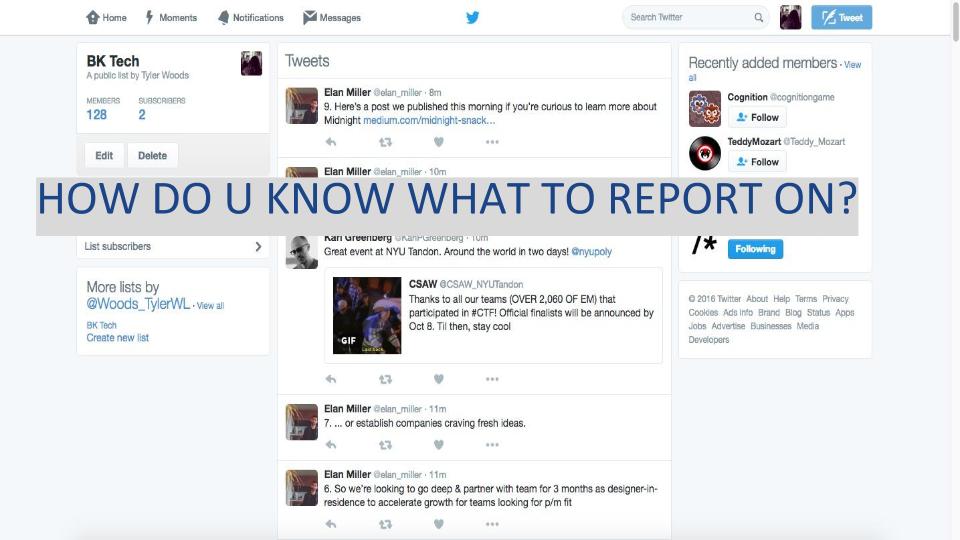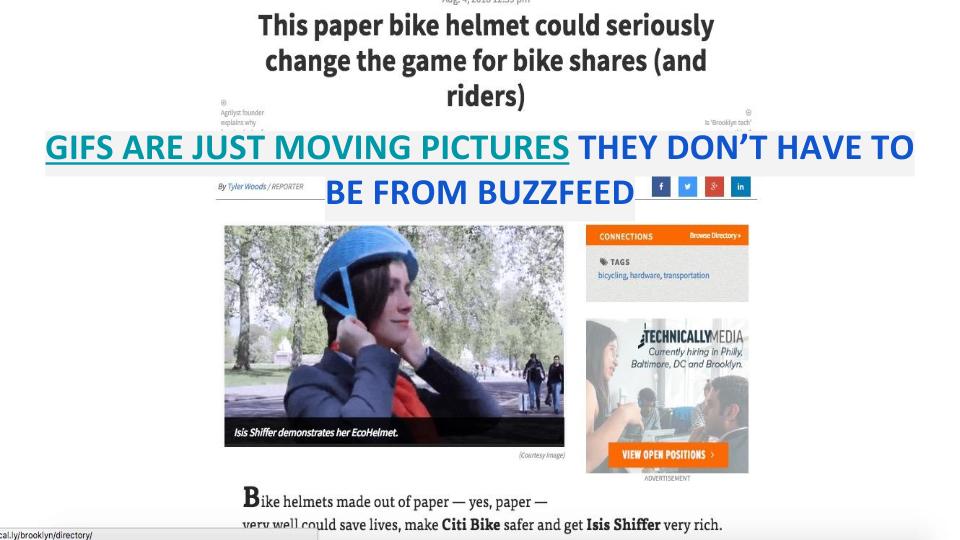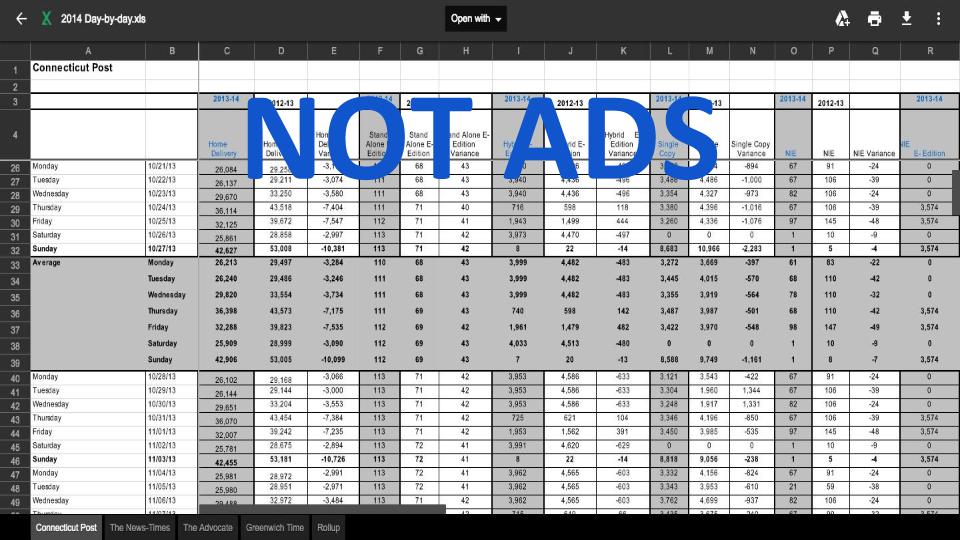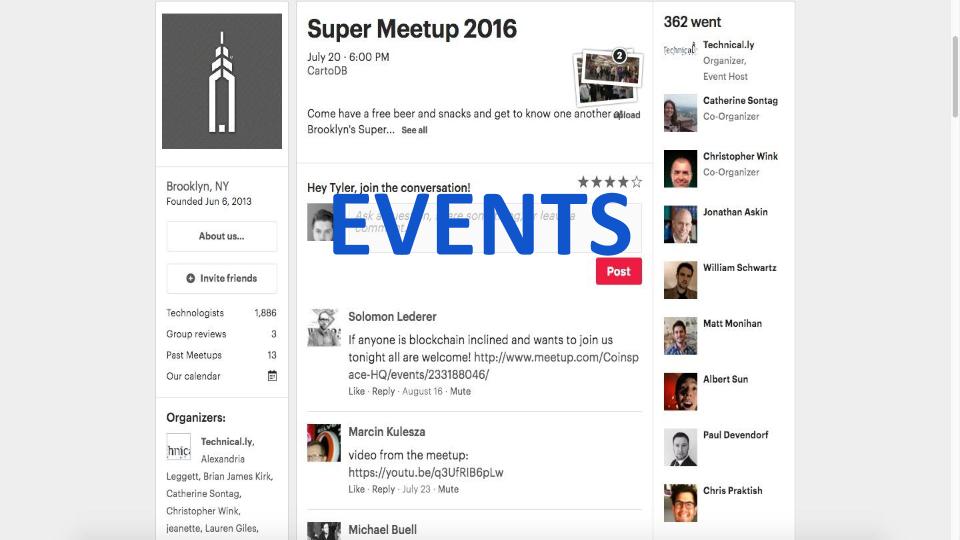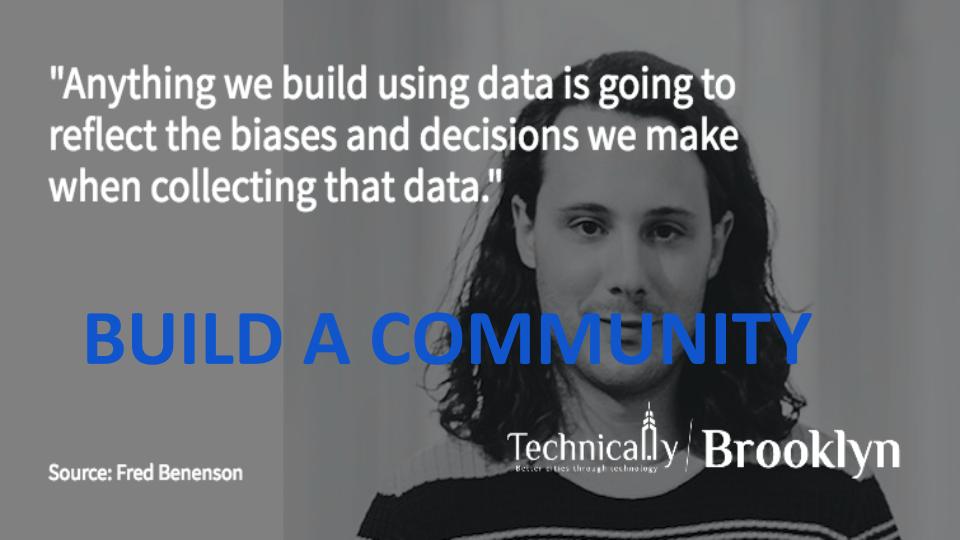Tuesday night at the CUNY Graduate School of Journalism I was invited to speak about Technical.ly Brooklyn and entrepreneurial journalism. What follows is a recollection of my thoughts on the topic of what it takes for a local news network* to make it in the crowded world of online media.
Here goes.
How do you know what to report on?
On a new beat, how do you break into a scene?
There are press releases sent to me and events to go to, but the thing I’ve found most effective is to keep a good Twitter list. I read my Twitter list for a half hour to hour every morning in bed, clicking on tweets and links I find interesting. I try to write two to three posts a day, so I’ll take the top two tweets and write news stories around them or email the writers for interviews.
I built the Twitter list originally from going back through old Technical.ly Brooklyn stories and reading interesting ones and adding the people in them to the list. Since I’ve been the lead reporter for the last year, I add people who I’ve done stories on or find interesting. I keep the list tight. Any time spent reading self promotion or mindless bloviating is time I’m not finding stories. So I unfollow liberally, as well. This Twitter list has become more important to me than my regular Twitter.
Try to innovate.
We’re new and trying to do an old thing — but better. It shouldn’t be a newspaper on a screen.
I try to include GIFs in almost every story. But these GIFs aren’t like reaction GIFs that your coworkers send at the end of every goddamn email. They’re more like moving pictures.
We did a cool story earlier this year about a structural engineer making a helmet out of paper. I took a few seconds of her Vimeo video and made a GIF out of it on Giphy, which by the way, is somehow worth more than the Washington Post. The GIF showed the invention almost as well as the 100-word description I wrote of it, which would have been better itself than just a still photo. Here’s the GIF (and the story):
It’s 2016, let’s have moving pictures.
Here’s another one, about a new feminist web publication starting up in Greenpoint. We wrote a post on their $3 million funding round. That GIF is objectively more interesting than a picture. It’s just a clip from their promo YouTube video on repeat.

How do you make money?
I don’t know how much I’m allowed to get into Technically Media’s finances but I will say this: We’re profitable. The margins are fairly slim, sure, but that’s pretty damn good for a bootstrapped media startup. The reason is because we don’t make our money off ads, we make it off events.
Ads are really cheap to buy, and as a community site, our audience is not national, it’s limited, so our clicks are too. Above is a document that was leaked to me some time ago by my old friends at Hearst Connecticut Media Group. It shows the year-over-year decline in subscriptions for the company’s flagship paper, the Connecticut Post. As I recall from the time I worked there (three years ago) print ads accounted for 70 percent of their revenue; digital accounted for 30 percent. From 2013 to 2014, their Sunday subscription dropped 20 percent. It dropped by at least 20 percent the year before that, too, and I don’t think the intervening years have been better. And they just couldn’t make money off the digital ads, which paid cents on the dollar compared to print ads.
That is, as we’re fond of saying in tech, not sustainable.
It’s events, man.
We host events. Our web publication helps build an audience and our events help coalesce the audience with face time in the meatspace.
This summer we had a banger of an event at CARTO’s Bushwick HQ, where more than 250 people attended. People who had never met before; people who didn’t know their business might mesh well with a fellow attendee’s startup; people who just wanted to meet other interesting, smart people building cool things. Our biggest event by far is Philly Tech Week, which is a weeklong smorgasbord of talks and networking, ideas and fun. There’s Baltimore Innovation Week (kicking off later this week!) and Delaware Innovation Week and we hope to be able to replicate that in Brooklyn soon.
Atlas Obscura has a similar revenue model, if I’m not mistaken (though the site did take on some venture capital in 2015).
Build a community.
Building a community is something everyone talks about but no one talks about how effing hard it is. You have to have a product so good that it goes above the infinite, screaming content stream of social media.
Community takes real people interacting in a given space. That is what Technical.ly is good at, since we’re a single-issue publication based in a densely populated area. But you still have to get creative. We’ve had readers of the site, like Caroline Sinders (who I saw at a bar Monday night), write posts from faraway tech conferences.
The image above comes from an interview with one of the members of the tech scene, Fred Benenson, who invented the term “mathwashing” — which basically just means that algorithms are created by humans and you can’t act like just because computers are involved there’s no bias or human error. I’d met Fred before at an event and we got along, so we basically just did a one-on-one interview about his idea. This isn’t the same as him writing it, but it’s pretty close, and it’s definitely engaging.
Make it happen.
When I worked in national television, I got so annoyed by crusty old producers giving me impossible tasks or “gets” and giving only the advice “make it happen.” OK, how? You can’t just make things happen. There are logistics, laws of physics you can’t change, people you can’t persuade, laws you can’t (or shouldn’t) break. I can’t just “make it happen!”
But, actually, it’s been one of the best lessons I’ve learned, however frustrating. Given no other option but to succeed, you chip away at the impossible tasks, your brain finds new ways of attacking a problem, you get creative. You find solutions where you thought there were none. In startups and in entrepreneurial journalism, this is what we need to do. Make it happen. Fucking make it happen.
—
*Technical.ly Brooklyn is one of five Technical.ly sites across the East Coast (see also: Philadelphia, Baltimore, Delaware and Washington, D.C.). Technical.ly is published by Technically Media, which also publishes Generocity.org.
Before you go...
Please consider supporting Technical.ly to keep our independent journalism strong. Unlike most business-focused media outlets, we don’t have a paywall. Instead, we count on your personal and organizational support.
3 ways to support our work:- Contribute to the Journalism Fund. Charitable giving ensures our information remains free and accessible for residents to discover workforce programs and entrepreneurship pathways. This includes philanthropic grants and individual tax-deductible donations from readers like you.
- Use our Preferred Partners. Our directory of vetted providers offers high-quality recommendations for services our readers need, and each referral supports our journalism.
- Use our services. If you need entrepreneurs and tech leaders to buy your services, are seeking technologists to hire or want more professionals to know about your ecosystem, Technical.ly has the biggest and most engaged audience in the mid-Atlantic. We help companies tell their stories and answer big questions to meet and serve our community.
Join our growing Slack community
Join 5,000 tech professionals and entrepreneurs in our community Slack today!

